New words- ЖА А С ЗДЕРҢ Ө DAY-OFF

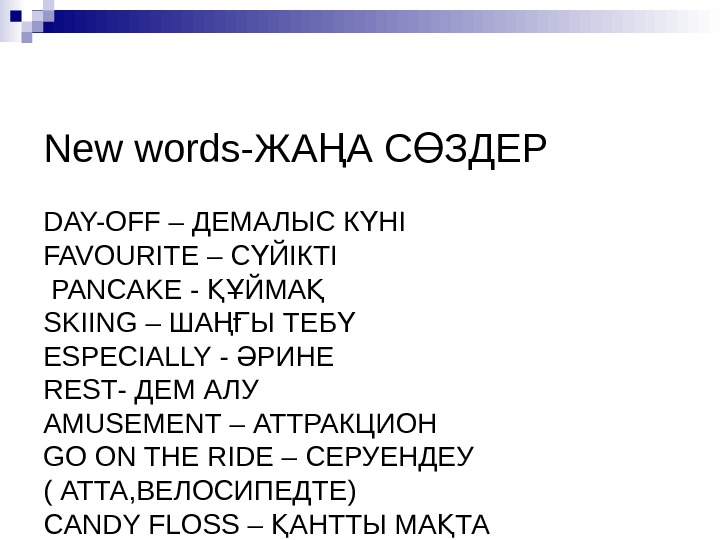
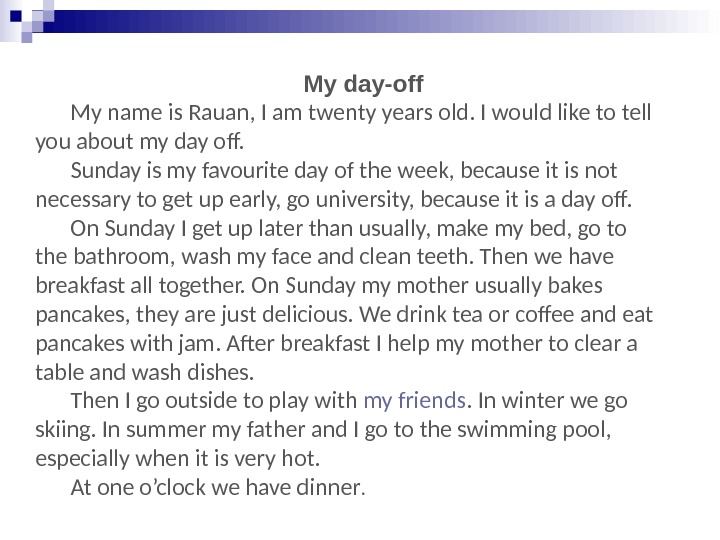

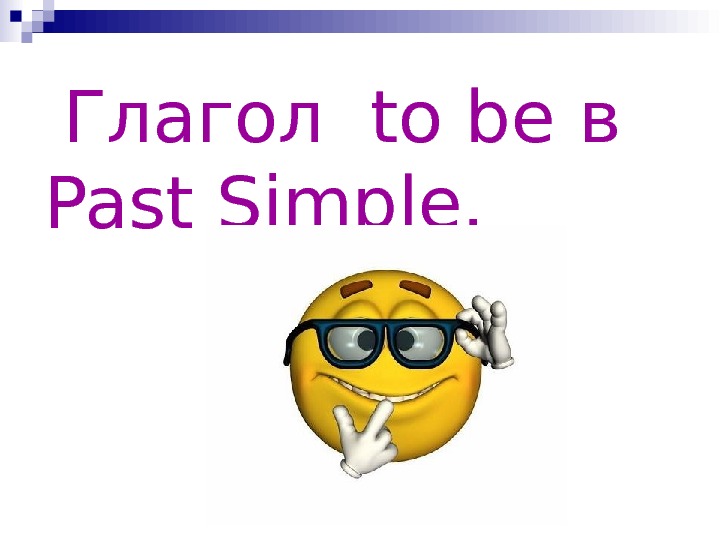

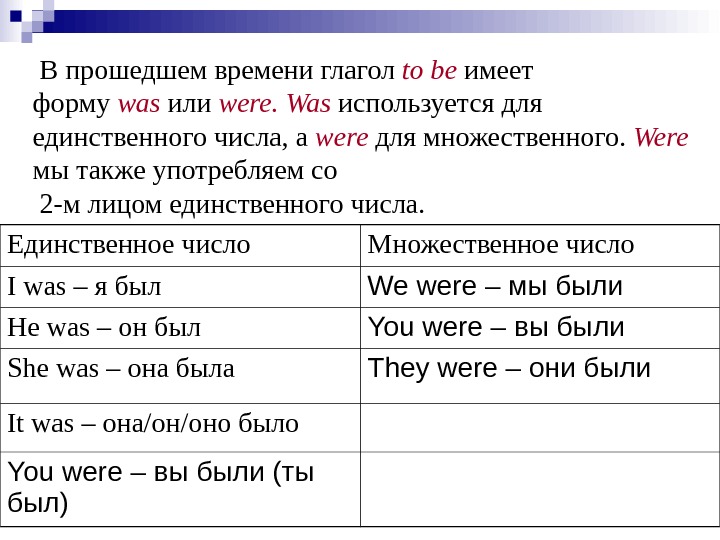

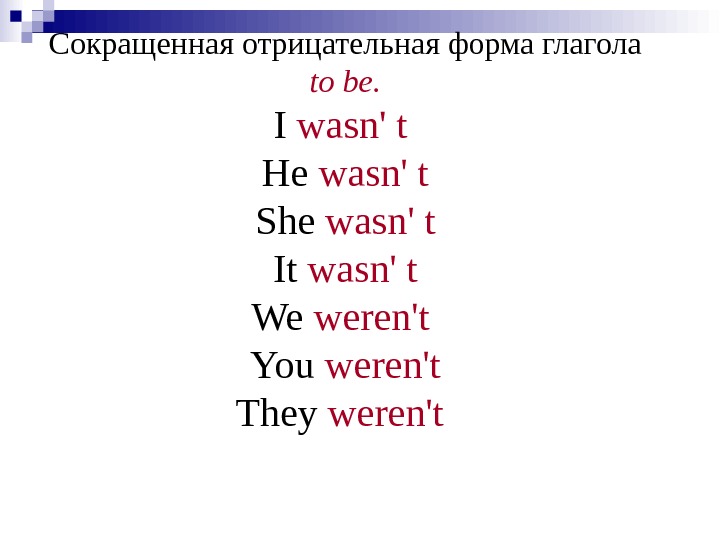
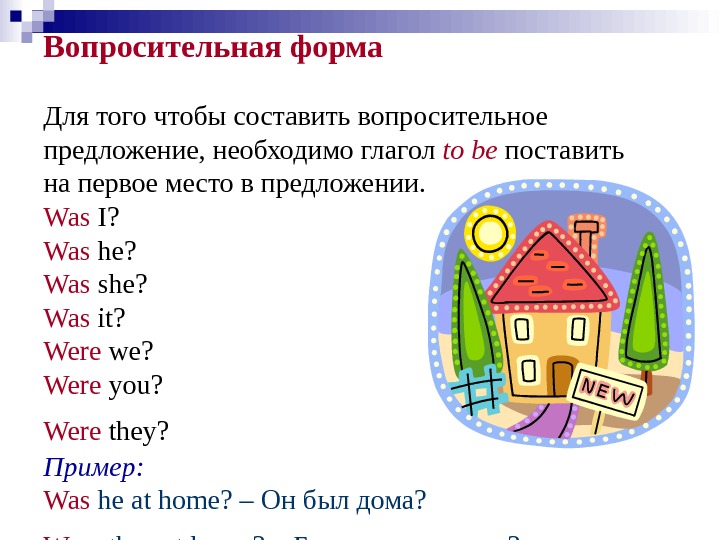



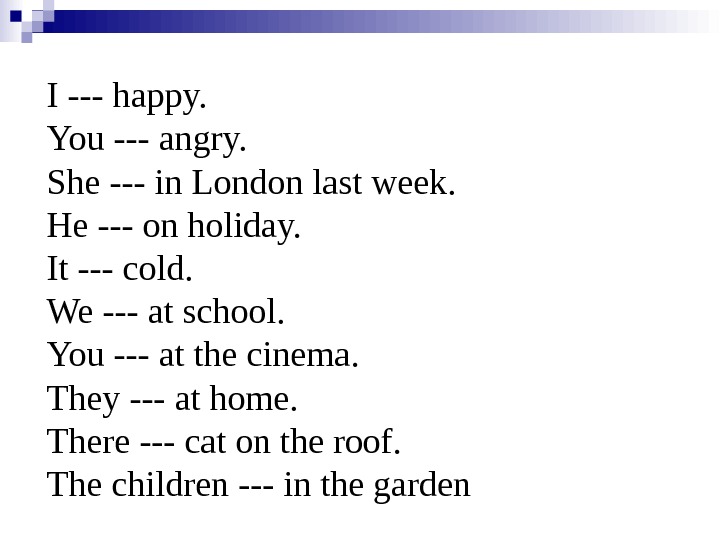
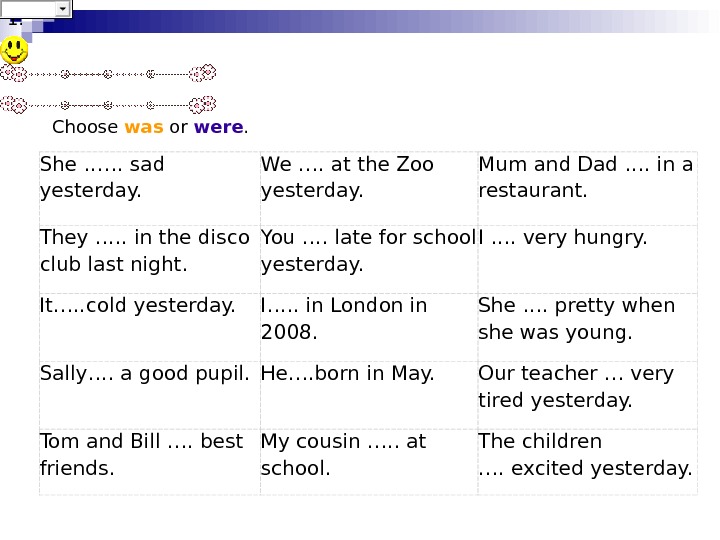

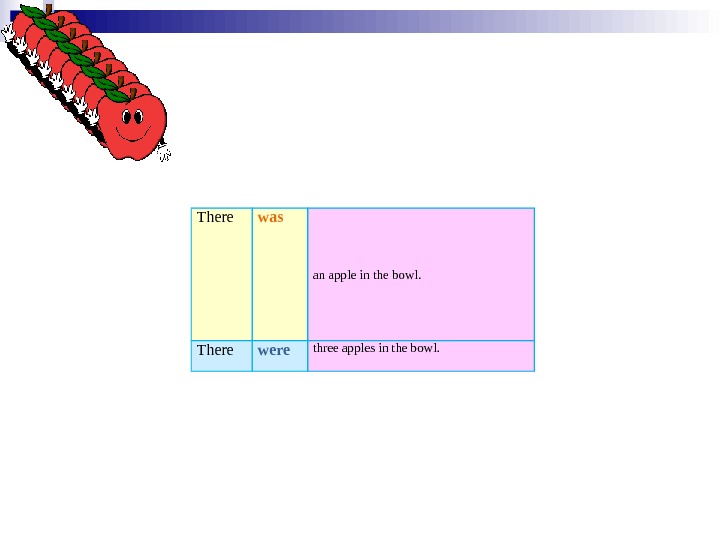



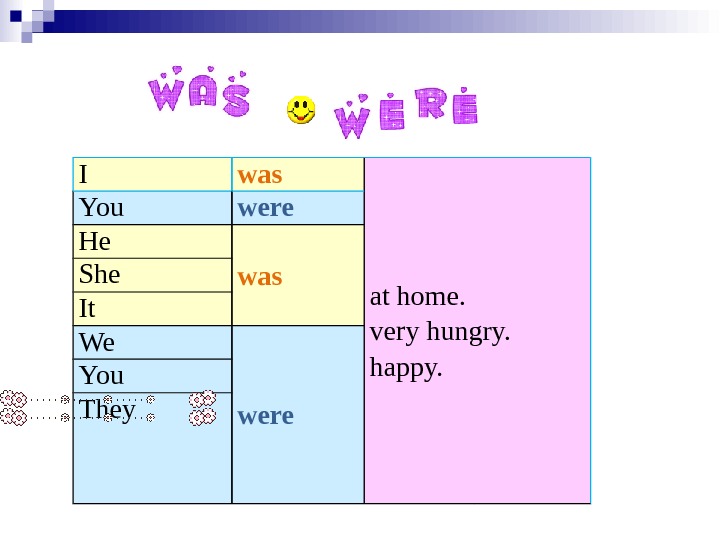
- Размер: 976 Кб
- Количество слайдов: 21
Описание презентации New words- ЖА А С ЗДЕРҢ Ө DAY-OFF по слайдам

 New words- ЖА А С ЗДЕРҢ Ө DAY-OFF – ДЕМАЛЫС К НІ Ү FAVOURITE – С ЙІКТІ Ү PANCAKE — ЙМА ҚҰ Қ SKIING – ША Ы ТЕБ ҢҒ Ү ESPECIALLY — РИНЕ Ә REST — ДЕМ АЛУ AMUSEMENT – АТТРАКЦИОН GO ON THE RIDE – СЕРУЕНДЕУ ( АТТА, ВЕЛОСИПЕДТЕ ) CANDY FLOSS – АНТТЫ МА ТА Қ Қ SATISFY – К ІЛ ТОЛУ ӨҢ
New words- ЖА А С ЗДЕРҢ Ө DAY-OFF – ДЕМАЛЫС К НІ Ү FAVOURITE – С ЙІКТІ Ү PANCAKE — ЙМА ҚҰ Қ SKIING – ША Ы ТЕБ ҢҒ Ү ESPECIALLY — РИНЕ Ә REST — ДЕМ АЛУ AMUSEMENT – АТТРАКЦИОН GO ON THE RIDE – СЕРУЕНДЕУ ( АТТА, ВЕЛОСИПЕДТЕ ) CANDY FLOSS – АНТТЫ МА ТА Қ Қ SATISFY – К ІЛ ТОЛУ ӨҢ
 My day-off My name is Rauan, I am twenty years old. I would like to tell you about my day off. Sunday is my favourite day of the week, because it is not necessary to get up early, go university, because it is a day off. On Sunday I get up later than usually, make my bed, go to the bathroom, wash my face and clean teeth. Then we have breakfast all together. On Sunday my mother usually bakes pancakes, they are just delicious. We drink tea or coffee and eat pancakes with jam. After breakfast I help my mother to clear a table and wash dishes. Then I go outside to play with my friends. In winter we go skiing. In summer my father and I go to the swimming pool, especially when it is very hot. At one o’clock we have dinner.
My day-off My name is Rauan, I am twenty years old. I would like to tell you about my day off. Sunday is my favourite day of the week, because it is not necessary to get up early, go university, because it is a day off. On Sunday I get up later than usually, make my bed, go to the bathroom, wash my face and clean teeth. Then we have breakfast all together. On Sunday my mother usually bakes pancakes, they are just delicious. We drink tea or coffee and eat pancakes with jam. After breakfast I help my mother to clear a table and wash dishes. Then I go outside to play with my friends. In winter we go skiing. In summer my father and I go to the swimming pool, especially when it is very hot. At one o’clock we have dinner.
 After dinner we have a short rest. My father goes to his study and reads newspapers. My mother watches TV set, my younger sister sleeps. As for me, I usually go to my room, read a book, listen to music or do my homework for the next week. In the evening we go to the park all together. It’s very big and beautiful. There a lot of different park amusements there. My sister and I like to go on the rides very much or just go for a walk with our parents. Our mother and father often buy us candy floss or popcorn. Then we go to café and order the biggest pizza. We eat, talk and laugh. We come home at ten o’clock in the evening, satisfied, tired and very happy that our day off turned out well. At home I go to the bathroom, take shower, clean my teeth and at eleven o’clock I go to bed.
After dinner we have a short rest. My father goes to his study and reads newspapers. My mother watches TV set, my younger sister sleeps. As for me, I usually go to my room, read a book, listen to music or do my homework for the next week. In the evening we go to the park all together. It’s very big and beautiful. There a lot of different park amusements there. My sister and I like to go on the rides very much or just go for a walk with our parents. Our mother and father often buy us candy floss or popcorn. Then we go to café and order the biggest pizza. We eat, talk and laugh. We come home at ten o’clock in the evening, satisfied, tired and very happy that our day off turned out well. At home I go to the bathroom, take shower, clean my teeth and at eleven o’clock I go to bed.
 Глагол to be в Past Simple.
Глагол to be в Past Simple.
 Прошедшее неопределенное время (Past Simple/ Past Indefinite) употребляется: Для выражения действия, имевшего место в прошлом, если время действия выражено такими словами, как yesterday вчера, last week на прошлой неделе, the other day на днях, an hour (a week, a month) ago час (неделю, месяц) назад и др. I was in the garden yesterday. Я был в саду вчера.
Прошедшее неопределенное время (Past Simple/ Past Indefinite) употребляется: Для выражения действия, имевшего место в прошлом, если время действия выражено такими словами, как yesterday вчера, last week на прошлой неделе, the other day на днях, an hour (a week, a month) ago час (неделю, месяц) назад и др. I was in the garden yesterday. Я был в саду вчера.
 В прошедшем времени глагол to be имеет форму was или were. Was используется для единственного числа, а were для множественного. Were мы также употребляем со 2 -м лицом единственного числа. Единственное число Множественное число I was – я был We were – мы были He was – он был You were – вы были She was – она была They were – они были It was – она/он/оно было You were – вы были (ты был)
В прошедшем времени глагол to be имеет форму was или were. Was используется для единственного числа, а were для множественного. Were мы также употребляем со 2 -м лицом единственного числа. Единственное число Множественное число I was – я был We were – мы были He was – он был You were – вы были She was – она была They were – они были It was – она/он/оно было You were – вы были (ты был)
 Отрицательная форма Для того чтобы образовать отрицательную форму, необходимо после глагола поставить отрицательную частицу not. I was not He was not She was not It was not We were not You were not They were not Пример: I was not at home – Я не был дома. John was not at home – Джон не был дома. Students were not at university – Студенты не были в университете.
Отрицательная форма Для того чтобы образовать отрицательную форму, необходимо после глагола поставить отрицательную частицу not. I was not He was not She was not It was not We were not You were not They were not Пример: I was not at home – Я не был дома. John was not at home – Джон не был дома. Students were not at university – Студенты не были в университете.
 Сокращенная отрицательная форма глагола to be. I wasn’ t He wasn’ t She wasn’ t It wasn’ t We weren’t You weren’t They weren’t
Сокращенная отрицательная форма глагола to be. I wasn’ t He wasn’ t She wasn’ t It wasn’ t We weren’t You weren’t They weren’t
 Вопросительная форма Для того чтобы составить вопросительное предложение, необходимо глагол to be поставить на первое место в предложении. Was I? Was he? Was she? Was it? Were we? Were you? Were they? Пример: Was he at home? – Он был дома? Were they at home? – Были ли они дома?
Вопросительная форма Для того чтобы составить вопросительное предложение, необходимо глагол to be поставить на первое место в предложении. Was I? Was he? Was she? Was it? Were we? Were you? Were they? Пример: Was he at home? – Он был дома? Were they at home? – Были ли они дома?
 Для того чтобы составить специальный вопрос, нужно соблюдать тот же порядок слов, что и в общем вопросе, но перед глаголом to be необходимо поставить вопросительное слово. Пример: Where were you? – Где ты (вы) был(и)? What was it? – Что это было?
Для того чтобы составить специальный вопрос, нужно соблюдать тот же порядок слов, что и в общем вопросе, но перед глаголом to be необходимо поставить вопросительное слово. Пример: Where were you? – Где ты (вы) был(и)? What was it? – Что это было?
 Краткие ответы в Past Simple строятся по общему правилу: повторяется тот глагол, который в вопросе стоит перед подлежащим. В кратких отрицательных ответах присутствует not , которое в разговорной речи сливается с глаголом. — Were you busy? ( Вы были заняты? ) — Yes, I was. (Да, я был занят. ) — Yes, we were. (Да, мы были заняты. ) — No, I wasn’t. (Нет, я не был занят. ) — No, we were not (weren’t). (Нет, мы не были заняты. )
Краткие ответы в Past Simple строятся по общему правилу: повторяется тот глагол, который в вопросе стоит перед подлежащим. В кратких отрицательных ответах присутствует not , которое в разговорной речи сливается с глаголом. — Were you busy? ( Вы были заняты? ) — Yes, I was. (Да, я был занят. ) — Yes, we were. (Да, мы были заняты. ) — No, I wasn’t. (Нет, я не был занят. ) — No, we were not (weren’t). (Нет, мы не были заняты. )
 Put in was or were into the gaps. 1 ) I —- in Canberra last spring. 2) We —- at school last Saturday. 3) Tina —- at home yesterday. 4) He —- happy. 5) Robert and Stan —- Garry’s friends. 6) You —- very busy on Friday. 7) They —- in front of the supermarket. 8) I —- in the museum. 9) She —- in South Africa last month. 10) Jessica and Kimberly —- late for school. was
Put in was or were into the gaps. 1 ) I —- in Canberra last spring. 2) We —- at school last Saturday. 3) Tina —- at home yesterday. 4) He —- happy. 5) Robert and Stan —- Garry’s friends. 6) You —- very busy on Friday. 7) They —- in front of the supermarket. 8) I —- in the museum. 9) She —- in South Africa last month. 10) Jessica and Kimberly —- late for school. was
 I — happy. You — angry. She — in London last week. He — on holiday. It — cold. We — at school. You — at the cinema. They — at home. There — cat on the roof. The children — in the garden
I — happy. You — angry. She — in London last week. He — on holiday. It — cold. We — at school. You — at the cinema. They — at home. There — cat on the roof. The children — in the garden
 She ……sad yesterday. We …. at the Zoo yesterday. Mum and Dad …. in a restaurant. They …. . in the disco club last night. You …. late for school yesterday. I …. very hungry. It …. . cold yesterday. I …. . in London in 2008. She …. pretty when she was young. Sally …. a good pupil. He …. born in May. Our teacher …very tired yesterday. Tom and Bill …. best friends. My cousin …. . at school. The children …. excited yesterday. 1. Choose was or were.
She ……sad yesterday. We …. at the Zoo yesterday. Mum and Dad …. in a restaurant. They …. . in the disco club last night. You …. late for school yesterday. I …. very hungry. It …. . cold yesterday. I …. . in London in 2008. She …. pretty when she was young. Sally …. a good pupil. He …. born in May. Our teacher …very tired yesterday. Tom and Bill …. best friends. My cousin …. . at school. The children …. excited yesterday. 1. Choose was or were.
 It …. . cloudy yesterday morning. We …. excited about going to America. We …. . lucky. We won the first prize. Thedogs…. . in the park. Jason …. a great swimmer when he was young. They…. at the beach last Sunday. She …. . the prettiest girl in our class. I…. very ill last week. I…. . sad because. I broke Mrs Smith’s window. He …. . born in 1995. 2. Complete with was or were.
It …. . cloudy yesterday morning. We …. excited about going to America. We …. . lucky. We won the first prize. Thedogs…. . in the park. Jason …. a great swimmer when he was young. They…. at the beach last Sunday. She …. . the prettiest girl in our class. I…. very ill last week. I…. . sad because. I broke Mrs Smith’s window. He …. . born in 1995. 2. Complete with was or were.
 There was an apple in the bowl. There were three apples in the bowl.
There was an apple in the bowl. There were three apples in the bowl.
 a bank near my house. ten children in the park. two kittens in the basket. a small shop between the bank and the supermarket. many bottles of milk in the fridge. some pencils on the desk. only one book on the table. an old man in the street. a lot of noise in the classroom. a huge crocodile in the river. . Complete with there was or there were.
a bank near my house. ten children in the park. two kittens in the basket. a small shop between the bank and the supermarket. many bottles of milk in the fridge. some pencils on the desk. only one book on the table. an old man in the street. a lot of noise in the classroom. a huge crocodile in the river. . Complete with there was or there were.

 hundreds of people. any traffic lights. a double-decker bus. a flag on top ofthe building on the left. many horse-drawn carriages. a lot of traffic. any zebra crossings. a roundabout. some old buildings. a great number of tourists.
hundreds of people. any traffic lights. a double-decker bus. a flag on top ofthe building on the left. many horse-drawn carriages. a lot of traffic. any zebra crossings. a roundabout. some old buildings. a great number of tourists.
 I was at home. very hungry. happy. You were He was. She It We were. You They
I was at home. very hungry. happy. You were He was. She It We were. You They
